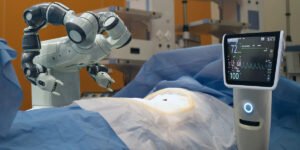Integrating artificial intelligence (AI) into today’s medicine is changing every part of the healthcare process. Artificial intelligence is ushering in a new era of precision medicine and better patient outcomes. It can now diagnose medical conditions and develop treatment plans for each patient. This article takes a closer look at how artificial intelligence is being used in medicine in the real world and looks at how it can transform everything from diagnosis to treatment.
Artificial Intelligence for Diagnosing Health Problems:
1. Imaging and Radiology
Artificial intelligence has a huge impact on medical imaging. Algorithms allow complex images such as MRIs and CT scans to be viewed quickly and accurately, something that was not possible before. Radiologists use artificial intelligence to detect problems, resulting in faster diagnoses and more accurate estimates.
2. Pathology and Histological Examination
In pathology, artificial intelligence makes research results more accurate. Pathologists can use machine learning algorithms to look at pathology slides and spot small trends and strange things. This not only speeds up the diagnostic process but also helps make the data more accurate.
3. Dermatology and Skin Diseases
Dermatology has come a long way thanks to artificial intelligence, which helps doctors figure out what skin problems people have. Dermatology apps, powered by artificial intelligence, can view and analyse photos of skin lesions. This helps people track changes and provides doctors with useful information for detecting problems early.
Artificial Intelligence that can Adjust Treatment Plans:
1. Accurate Medication
One of the most exciting things about artificial intelligence in medicine is how it can help improve precision medicine. Artificial intelligence can look at very large data sets of genetic information to find specific signals and genetic mutations that influence the effectiveness of treatments. This makes it possible to tailor treatment plans to each patient, improving efficacy and reducing side effects.
2. Finding and Producing New Medicines
Traditional methods of making poison take a long time and cost a lot of money. Artificial intelligence speeds up this process by looking at massive data sets to find potential drug candidates, guessing how effective they will be and making clinical trials run more smoothly. Using artificial intelligence in this way can make new treatments more accessible.
3. Treatment Adjustment
Artificial intelligence makes personalised treatment plans based on each patient’s unique characteristics easier. An individualised treatment is developed by taking into account factors such as genetics, lifestyle and previous treatment experiences. This approach can improve the effectiveness of treatment and reduce the risk of side effects.
Artificial Intelligence in Healthcare:
1. Virtual Care Assistant
Virtual health assistants and chatbots, powered by artificial intelligence, are becoming increasingly important for patient care. These tools can help with mental health, answer patients’ questions and tell them to take their medications. They help make the treatment easier to administer and more patient-oriented.
2. Monitor Patients Remotely
With the rise of smart technology and the Internet of Things (IoT), artificial intelligence makes it easier to focus on patients remotely. Healthcare professionals can monitor a patient’s vital signs, medication use, and overall health by continuously collecting and analysing data. This makes early action and tailor-made care possible.
3. Telemedicine Platform
Many people are using telemedicine these days, and artificial intelligence is making these systems work better. AI-powered diagnostics, virtual consultations and remote monitoring can all help extend healthcare services beyond standard clinical environments.
Questions and Things to Think About:
1. Data Privacy and Security
The use of artificial intelligence in healthcare raises concerns about data protection and patient privacy. Protecting private health information is important and requires a strong security approach and compliance with ethical rules.
2. Platform-Independent Use and Standardisation
Getting disparate healthcare systems to work together and standardising data forms are ongoing challenges. For AI tools to work seamlessly with today’s healthcare system, everyone must work together to develop common standards.
3. Concerns about Ethics and Bias
There may be bias in the materials with which artificial intelligence algorithms are trained. To ensure that artificial intelligence is used ethically, biases based on race, gender, and socioeconomic status must be addressed so that healthcare outcomes are not disparate.
The Future Development Direction of Artificial Intelligence in the Medical Field:
1. Working Together to Increase Intelligence
The future of artificial intelligence in medicine is not to replace doctors and nurses, but to let them do better work. Collaborative model initiatives where artificial intelligence works together with human physicians will increase efficiency and improve patient care outcomes.
2. The Diagnosis Continues to Improve
As AI systems become smarter, their diagnostic capabilities will continue to improve. Artificial intelligence has the potential to change the way medical tests are performed through early disease detection and rare disease detection.
3. Empower Patients through Artificial Intelligence
More and more artificial intelligence tools will emerge to give people more control over their healthcare. With virtual health assistants and personalised health apps, patients have more ways than ever to get information and help.
Conclusion:
Using artificial intelligence in medicine is not a far-fetched dream; it’s already here and changing the way we think about healthcare. Artificial intelligence is a force for change. It can diagnose medical problems with unprecedented accuracy and create a unique treatment plan for each patient. But figuring out how to handle issues of ethics, privacy, and interoperability will be important to ensure that artificial intelligence in medicine truly delivers on its promise to improve patient outcomes and advance healthcare. We are at a moment when human knowledge meets new technologies. The key to an era of more personal, efficient and patient-centered medicine lies in the collaboration between healthcare professionals and artificial intelligence systems.
FAQs:
1. How does artificial intelligence improve the diagnostic accuracy of medical imaging?
Artificial intelligence excels at analysing complex medical images, such as MRI and CT scans, to provide fast, accurate insights. This can help healthcare professionals detect abnormalities and ensure faster, more accurate assessments, improving diagnostic accuracy.
2. Can AI truly develop personalised treatment plans for individual patients?
Absolute. Artificial intelligence analyses various data sets, including genetic information and treatment outcomes, to identify specific biomarkers and tailor treatment plans. This personalised approach maximises the effectiveness of the treatment and minimises side effects.
3. What are some real-world examples showing the use of artificial intelligence in medicine?
For example, IBM Watson for Oncology helps oncologists plan cancer treatment, while Google’s DeepMind can be used to analyse medical images and predict disease progression. These demonstrate the impact of artificial intelligence on diagnosis and treatment.
4. Beyond diagnosis and treatment, how can artificial intelligence contribute to patient care?
AI-powered virtual health assistants, remote patient monitoring, and telemedicine platforms play a crucial role in patient care. These tools answer patient questions, provide medication reminders, and help provide a more convenient and patient-centered healthcare experience.
5. What challenges does artificial intelligence face in medicine and how can they be addressed?
Challenges include data security, interoperability and ethical considerations. Efforts are underway to implement strong cybersecurity measures, enable interoperability between healthcare systems, and eliminate bias to ensure the responsible and equitable implementation of artificial intelligence in medicine.



